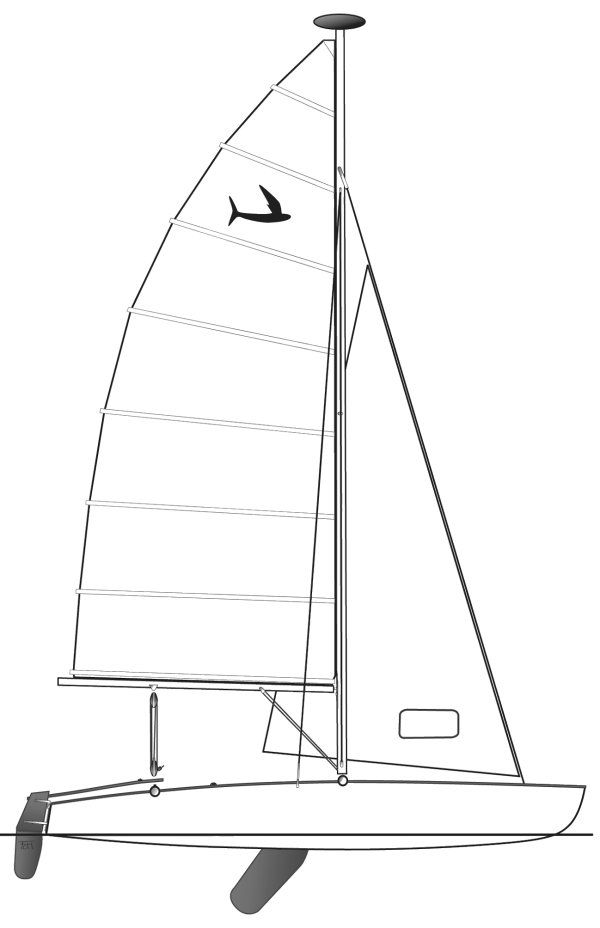The Exocet, a compact 16-foot catamaran, represents an early and significant entry into the recreational multihull market, designed primarily as a nimble day-sailer and a spirited weekender. Conceived by the naval architect Lucien Gourmez and built by the French shipyard La Prairie, the Exocet emerged during a period of burgeoning interest in accessible sailing. Its design emphasized speed, simplicity, and the unique performance characteristics inherent in a catamaran, setting it apart in the sailing landscape of the early 1960s.
Exocet Information, Review, Specs

- Make
- Model
- Number Built
- Production Year(s)
- 1961 - ??
History and Design
The story of the Exocet begins in 1961, marking its debut as one of the very first production catamarans available to the public. This timeline predates the formal establishment date of La Prairie as commonly cited in historical records, though the shipyard itself was operational from 1961, with Michel Nivelt, a partner in La Prairie, instrumental in its development. La Prairie, a French boat builder recognized for its high-volume production of small, accessible sailing craft, began its operations by efficiently manufacturing vessels like the Exocet, making sailing more widely available. The company's ethos, even in its formative years, leaned towards standardized and efficient manufacturing processes, prioritizing affordability and usability over bespoke designs. While specific details on Gourmez's design philosophy for the Exocet are scarce, its very nature as a small, fiberglass catamaran points to a goal of delivering exhilarating performance and ease of handling within a compact package.
Sailing Performance and Handling
As a light, 16-foot (5.13 m) catamaran, the Exocet was engineered for lively sailing and impressive speed, particularly for its size. With a length overall of just under 17 feet and a generous beam of 7.71 feet, it boasts the inherent stability and shallow draft typical of multihulls. Owners and reviewers have characterized the Exocet as an exciting boat to sail, capable of reaching speeds around 7 knots in moderate 10-knot breezes, showcasing its agility and responsiveness. Its twin-rudder system and centerboard keels contribute to its excellent maneuverability and ability to navigate shallow waters, with a minimum draft of just 0.43 feet when the boards are retracted. This design makes it well-suited for coastal exploration and spirited day racing, offering a dynamic sailing experience.
Accommodations and Layout
Given its compact dimensions, the Exocet catamaran is primarily designed for day sailing and short excursions rather than extensive cruising. The interior accommodations are, by necessity, minimal. Without specific information regarding headroom or detailed interior layouts for the 16-foot model, it can be inferred that any enclosed spaces would likely be confined to basic storage compartments within the hulls or a rudimentary shelter suitable for temporary respite rather than comfortable living. Its design prioritizes cockpit space for sailing and enjoying the outdoors, consistent with the philosophy of a small, performance-oriented multihull intended to provide an accessible and exciting sailing experience on the water.
Measurements
Construction & Hull
- Construction Material
- Fiberglass (Solid)
- Hull Type
- Catamaran Sailboat
- Keel Type
- Centerboard
- Ballast
- -
- Displacement
- 309 lbs
- Water Capacity
- -
- Fuel Capacity
- -
Engine
- Engine Make
- —
- Engine Model
- —
- Engine Type
- —
- Engine HP
- —
- Engine Count
- 1
- Drive Type
- —
- Fuel Type
- —
Rig & Sails
- Rig Type
- Fractional Sloop
- P (Main Luff)
- -
- E (Main Foot)
- -
- I (Foretriangle Height)
- -
- J (Foretriangle Base)
- -
- Forestay Length (est)
- -
- Main Sail Area
- -
- Foretriangle Sail Area
- -
- Total Sail Area (Reported)
- 182 sqft
- Total Sail Area (Calc)
- -
Dimensions
- LOA
- 16.83 ft
- LWL
- 15.98 ft
- Beam
- 7.71 ft
- Draft
- 2.46 ft
- Max Headroom
- -
- Air Draft
- -
Calculations
- Hull Speed
- 5.36 kn
- Pounds per Inch Immersion
- —